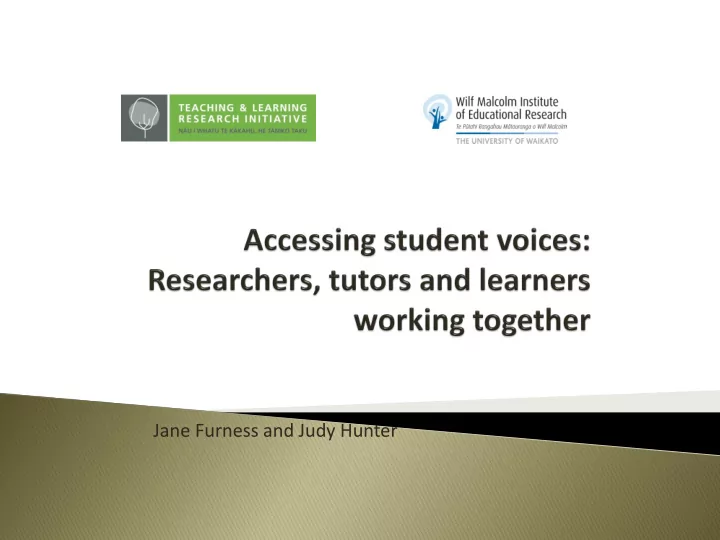

Jane Furness and Judy Hunter
Research overview Research design and programme design – where are the students’ voices ? What we have learned so far from students Reflection and awareness We acknowledge our research partner, Literacy Aotearoa, in particular, Te Tumuaki Bronwyn Yates and research staff Peter Isaacs and Katrina Taupo, along with the tutors and learners involved in the research.
“ Using a wellbeing framework to recognise, value and enhance the broad range of outcomes for learners in adult literacy and numeracy programmes ” Aim Literacy – social ◦ Find a meaningful and manageable way to identify practice Wellbeing – and record broad outcomes beyond skills holistic, Context integrative ◦ Adult literacy and numeracy is valued – the focus is on skills ◦ Acceptance that broad outcomes accrue from L/N programmes ◦ No current systematic evidence-gathering of broad outcomes
Durie’s models of Māori wellbeing e.g. Te Whare Tapa Wh ā (Durie, 1998) Dialogical between tutor and learner Narratives mapped to wellbeing indicators, guided by Whakatauki Student voices The research is seeking • Narrative Time efficiencies • Shared mapping Breadth of outcomes for • Learner exit statements diverse learners
How can a wellbeing framework be further developed for 1. incorporation into a programme in ways that engage tutors and learners in the outcomes and that are meaningful and manageable for them? What broad wellbeing outcomes can adult learners identify 2. as a result of their engagement in literacy and numeracy learning? How does the use of a wellbeing framework help learners 3. assume ownership of their continuing learning?
Learner representations of what is important to them in their everyday lives Photo elicitation and Facebook dialogue Classroom dialogue Identifying broad outcomes Recording broad outcomes
Learner representations of what is important to them in their everyday lives has potential as a reflection tool Photos can work well as reflection tools but technological challenges can outweigh the reflection value Tutors and learners need support to identify broad wellbeing-related outcomes Facebook is too high-risk for privacy breaches for these learners
Learner Tutor Complex lives School teaching background Survival focus Skills vs social focus Variable familiarity with Strengths vs deficits social media technologies orientation
How might tutors create a sense amongst their learners that those 1. things that are important to the learners in their everyday lives are valued in the programme? How can tutors simply and safely have regular conversations with 2. learners about the contribution of their learning to their wellbeing? How can tutors simply and safely record, or facilitate students’ to record, 3. identified wellbeing effects? How might the tutors be supported in this?
Challenge for tutors Planned actions Learner representations of Giving attention to what is important to them in wellbeing outcomes their everyday lives without diverting the Wellbeing statement programme away from its displayed in classroom core purpose Regular reflection on how Professional learning is linked to broad conversations with outcomes and amongst Classroom conversations and tutors about how journaling about broad this might be done outcomes as natural part of the classroom
Challenges for tutors Planned actions Extending conversations Use of Facebook replaced with journaling Having safe conversations Setting regular reflection Encouraging reflection and journaling times Having time Additional questions to Professional guide reflection conversations with Tutor guidelines and amongst tutors about how Professional conversations this might be done
Challenges for tutors Planned actions Recording soon after Set journaling times Provide journals automaticity, systematically Recording safely Professional conversations with and amongst tutors about how this might be done
1. … communication, honesty, trustworthy, what we share in the group is trustworthy and honesty. 2. I was sort of brought up to do everything yourself, you know? Don’t ask for help. If you got yourself in trouble, get yourself out of trouble. But no I have gained, you know, I sort of try it once, and if it doesn’t work I go... I ring up someone now. Yeah, but whereas before it would be, ‘I’ll just keep doing it until I get frustrated with myself!’ You know?
Tutor awareness is needed to support learner awareness Valuing of and capacity to recognise and talk about broad outcomes Classroom/organisational milieu Tutor interactions with learners A significant shift in thinking for some tutors and learners and some organisational changes Researchers, tutors and learners required to get strong and sharing our experiences to true student voice support this development – could not be done alone
Student voices articles Hei Ara Ako ki te Oranga (Hutchings et al, 2013) Te Whare Tapa Whā (Durie, 1998) Personal, relational and collective wellbeing framework (Nelson & Prilleltensky, 2005) The contribution of family literacy programmes to the wellbeing of individuals, families and communities (Furness, 2012) http://www.tlri.org.nz/tlri-research/research-progress/post-school- sector/using-wellbeing-framework-recognise-value-and https://www.waikato.ac.nz/wmier/projects/using-a-wellbeing- framework-to-recognise,-value-and-enhance-the-broad-outcomes-for- learners-in-adult-literacy-and-numeracy-programmes
Recommend
More recommend